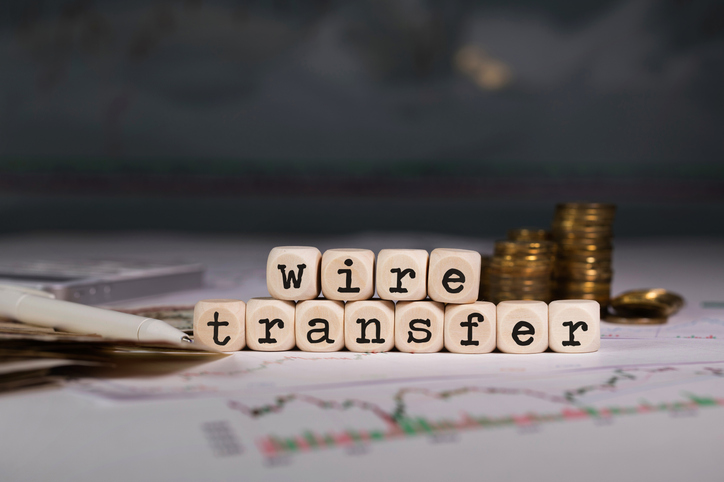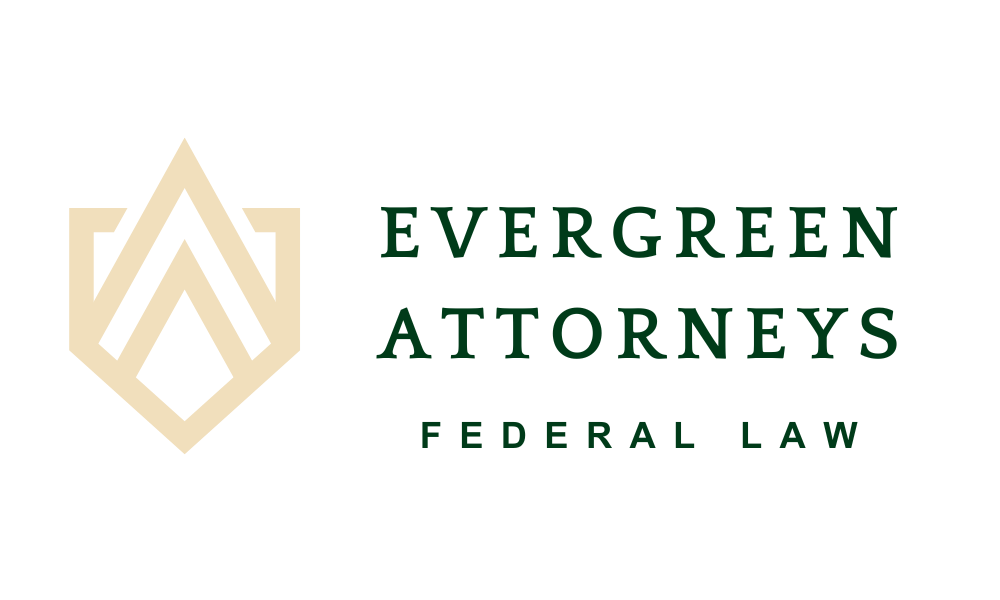Share
Share

Denver Wire Fraud Lawyers
Federal wire fraud criminal cases can be intimidating and scary. The Denver wire fraud lawyers at Evergreen Attorneys are ready to bring hope and a plan for your defense. If you are facing the uncertainty of a federal wire fraud criminal investigation, you deserve the absolute best team at your side from day one.
What Makes Evergreen Attorneys Different?
We only handle federal cases.
There are dozens if not hundreds of lawyers you can find on the internet who claim to be experienced federal criminal defense lawyers. Almost all of these Denver wire fraud lawyers claim to be “experts” or “fighters” who will give you “aggressive representation” or something similar.
Here are some of the things that we think makes Evergreen Attorneys different from the pack:
- We only practice federal criminal defense. No family law clients, no medical malpractice, no transactional lawyers. All federal work. Every day.
- We only employ experienced partner-level attorneys. No fresh-faced associates right out of law school.
- We are a boutique federal white collar law firm. Every decision is tailored towards providing client-first exceptional criminal defense.
- Evergreen Attorneys handles cases nationwide. We are not interested in being golfing buddies with the prosecutor.
Denver Federal Wire Fraud Defense Playbook
Wire fraud is one of the most commonly used charges in federal court. It is especially common in our Denver white collar criminal defense cases. Prosecutors look to use the blunt instrument of wire fraud to build most of their economic offense cases from.
That is why you need a federal lawyer who understands the ins and outs of federal wire fraud. You deserve, not need, a federal criminal defense team with a strategic vision to help guide you to hope and a plan for your defense.
What is Federal Wire Fraud?
Federal wire fraud is one of the most common charges that Evergreen Attorneys see in their white collar criminal defense practice. Prosecutors love to use wire fraud charges as a weapon to scare defendants into pleading guilty. That’s because wire fraud can be punished by up to 20 years in prison even on your first criminal conviction ever. See 18 U.S.C. Section 1343.
There are four essential elements to required to prove a violation of the federal wire fraud laws (18 U.S.C. Section 1343):
(1) that the defendant voluntarily and intentionally devised or participated in a scheme to defraud another out of money;
(2) that the defendant did so with the intent to defraud;
3) that it was reasonably foreseeable that interstate wire communications would be used; and
(4) that interstate wire communications were in fact used. See United States v. Profit, 49 F.3d 404, 406 n.1 (8th Cir. 1995).
Each one of these elements must be proved at trial beyond a reasonable doubt to sustain a wire fraud conviction in federal criminal court.
When are Federal Wire Fraud Charges Filed?
As you can see from the four elements above, wire fraud is incredibly broad under federal law. In fact, virtually every single federal white collar (read: economic) crime will meet the bare bones definition of federal wire fraud under 18 U.S.C. Section 1343.
Cases involving securities fraud, healthcare fraud, bank fraud, insurance fraud, and even identity theft might very well also qualify as “federal wire fraud” if you read this law broadly.
According to the Department of Justice regulations in the DOJ Manual, wire fraud prosecutions should not be filed in every single case. As the Department of Justice says:
Prosecutions of fraud ordinarily should not be undertaken if the scheme employed consists of some isolated transactions between individuals, involving minor loss to the victims, in which case the parties should be left to settle their differences by civil or criminal litigation in the state courts. Serious consideration, however, should be given to the prosecution of any scheme which in its nature is directed to defrauding a class of persons, or the general public, with a substantial pattern of conduct.
See DOJ Manual, Section 9-43.00 Mail Fraud and Wire Fraud (available at https://www.justice.gov/jm/jm-9-43000-mail-fraud-and-wire-fraud). This policy statement, unfortunately is not something that criminal defendants are able to enforce in court.
Instead, it is merely a “guide” that prosecutors are supposed to use when exercising their discretion. That discretion is of little comfort to U.S. citizens facing the terrifying prospect of federal wire fraud charges in their case.
What is the Mandatory Minimum Prison Sentence for Federal Wire Fraud?
There is no mandatory minimum prison sentence for federal wire fraud charged under 18 U.S.C. Section 1343. Remember from above that a federal wire fraud conviction may be punished with a sentence anywhere from 0 to 20 years in federal prison.
What does that mean in practice?
It means that even if you are convicted of federal wire fraud, there is still a possibility that you can be sentenced to federal probation or home confinement.
In fact, the experienced wire fraud lawyers at Evergreen Attorneys know that each federal judge is required to consider alternatives to incarceration when imposing a sentence in a federal wire fraud case. See 18 U.S.C. Section 18 U.S.C. 3553(a)(3) (judge required to evaluate the “kinds of sentences available”).
You need experienced federal criminal defense lawyers in your corner if you want to have a realistic chance at avoiding serious prison time in your federal wire fraud case. Your plan for mitigation and explaining your circumstances to the judge needs to start early on when crafting a defense.
If you want to avoid significant prison time for a wire fraud conviction you need a strategic vision for your defense. You need hope and a plan. That is where Evergreen Attorneys can shine.
What actions can be used to charge Colorado federal wire fraud?
Prosecutors can use all kinds of communications to support wire (and mail) fraud. Letters, bank transfers, emails, SMS messages, Social Media direct messages, and more have been used to bring wire fraud charges.
In general, if a writing (something put down on a page electronically or in the physical world) is used to further a scheme to defraud, prosecutors can try to bring a wire fraud charge based on the writing.
What are Denver federal wire fraud defenses?
Veteran federal wire fraud defense attorneys know that each case is different. That is why listening to your client is the most important skill that any federal criminal defense lawyer can have. The best defenses in each case turn on the specific facts and background of your clients.
In general, there are a few common types of wire fraud defenses that the best federal criminal defense lawyers typically see. Below, we cover some of those federal wire fraud defenses and give concrete examples of how they might work in a real courtroom.
Wire Fraud Defense #1- No Intent To Defraud
The first element in wire fraud is showing that there was an “intent to defraud” or a scheme to defraud. This means that where a defendant acted without intent (or simply in good faith), the wire fraud charges will not hold up in court.
Real World: A common example we see from our clients is the failed business venture. Many of our white collar criminal cases in federal court stem from entrepreneurs who honestly were trying to start a legitimate business, but perhaps got too far out over their skis before the venture fell apart.
Wire Fraud Defense #2 – Reliance on Counsel
If you acted in good faith—believing statements were true, believing services or products would be delivered, or relying on your attorney or accountant’s guidance—the government cannot prove intent to defraud. In appropriate cases, a reliance-on-counsel instruction can help the jury understand that obtaining and following legal advice, even if things went wrong, can negate fraudulent intent. This is similar to a “good faith” defense available in some cases as well.
Real World: Reliance on counsel is a common defense for our white collar wire fraud clients. Often times buisnessmen will seek out advice from attorneys before embarking on conduct. You need to show that you disclosed all material facts to your attorney and reasonably relied on the advice in your conduct. United States v. Scully, 877 F.3d 464 (2d Cir. 2017).
Wire Fraud Defense #3 – Lack of Material Misrepresentation
Real World: Not every mistake or omission is fraud. The statement must be materially false—capable of influencing the decision of the recipient. Demonstrating that alleged misstatements were immaterial, puffery, or opinion (e.g., projections or forward-looking estimates with disclosed risks) can defeat the government’s case.
- United States v. Weimert, 819 F.3d 351, 357–63 (7th Cir. 2016) Holding: Reversed wire-fraud convictions; misrepresentations about negotiating positions and internal intentions in arm’s‑length dealmaking were not material deceptions about facts. Deception in bargaining isn’t automatically fraud absent material falsehoods that go to the nature of the bargain. Source: https://law.justia.com/cases/federal/appellate-courts/ca7/14-2323/14-2323-2016-04-08.html
Other Wire Fraud Defenses
There are many other wire fraud defenses in federal court depending on the specific facts of your case. You need a strategic vision for your federal criminal defense to wire fraud charges.
Strategic vision for federal wire fraud defense does not come from ChatGPT. It does not come from DUI attorneys. It can only be gained through years of experience and hard work as a federal criminal defense attorney. Call Evergreen Attorneys today if you need hope and a plan for your wire fraud defense.
Does the Government Have to Prove The Interstate Element?
Yes! All too often at Evergreen Attorneys, we see federal criminal defense attorneys stipulate away the element of “interstate” wire transmissions in these cases. That is a terrible idea for many reasons. Chief among them is the idea that if you are going to take a case to trial you need to make the Government prove each and every single vital element.
Why would you make the Government’s case any easier for them? They are trying to throw your client into prison after all.
The Denver wire fraud lawyers at Evergreen Attorneys recently covered a Tenth Circuit case where the prosecution failed to proved the “interstate” element. We covered the case of United States v. Baker in our November 3rd White Collar Corner blog which you can read here: https://evergreenattorneys.com/criminal-defense/white-collar-corner-federal-criminal-defense-november-3rd/. Here is how the Baker case was won on appeal on the “interstate” wire issue:
By all accounts, Matthew Baker, was not a great guy. He essentially tried to screw over his own brother and some financial institutions. Matthew owed his brother $445,000. After selling some real estate that earned him more than enough to cover the $445,000, Matthew tried to cut his brother out and keep all the funds.
Baker first called the escrow agent for the real estate deal and lied about how the money should be split. Baker also went on the internet and falsified documents maintained by the state corporation authorities to make it look like he was the owner of the business where the proceeds were supposed to be sent to.
Baker’s not-so-good deeds resulted in a jury conviction on two-counts of federal wire fraud. Count One alleged a federal criminal wire fraud based on the telephone call to the escrow agent. Count Two alleged federal criminal wire fraud based on the alteration, using the internet, of the Utah Corporation Commission records.
On appeal, Maththew argued that the government did not put any evidence in front of the juryt to prove that the wire-transmission underlying Count Two (the fake documents) traveled in interstate commerce. To prove a federal wire fraud violation of 18 U.S.C. Section 1343 the federal government must show that the acts occurred in interstate commerce. The Tenth Circuit has long held that this means the government must prove that the charged communications actually crossed state lines. United States v. Kieffer, 681 F.3d 1143, 1153 (10th Cir. 2012).
In the vast majority of cases, this “interstate” wire element is easy to prove. The Government can simply call an employee of some company with an office in another state and show that they received the “wire” or message over the internet.
However, the Tenth Circuit has also held that an individual’s use of the internet without more does not establish an interstate transmission (i.e., that it actually crossed state lines). Kieffer, 681 F.3d at 1155.
In the Baker case, the only evidence on this element was that 1) Matthew used the internet while located in Utah 2) title company employees in Utah looked at the website twice and 3) that the Utah business-entity website is publicly available to anyone on the internet.
According to the Tenth Circuit, this was not enough to establish an interstate transmission. The Tenth Circuit held that the conviction was clear and obvious error and reversed. Baker’s case stands for the almost universal maxim: do not stipulate away anything that the government would otherwise be required to prove at trial.
Contact the Denver Wire Fraud Lawyers at Evergreen Attorneys for a confidential consultation.
If you’re facing federal charges or need help navigating a legal battle, don’t wait to seek legal assistance. Contact our Evergreen Attorneys today for a confidential consultation. We’re here to help you understand your options and build a strong defense. You may also call us at 303-948-1489 or email us at [email protected] to get in touch with an experienced federal lawyer at Evergreen Attorneys today.
Zachary Newland
Zachary Newland is an attorney, author, aspiring BBQ connoisseur, and mediocre skier. Zachary's law practice is focused on federal criminal defense, federal appellate advocacy including post-conviction remedies, civil rights litigation, and complex trial work. Zach lives in Evergreen, Colorado with his family. You can reach Zach at [email protected] to discuss your case or call him directly at 303-948-1489.
STAY IN THE LOOP
Subscribe to our free newsletter.
Federal Sentencing Lawyers A conviction [...]












